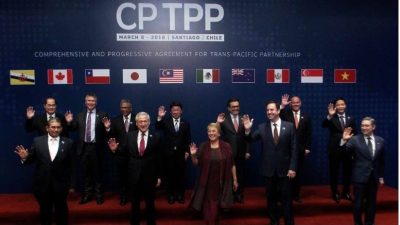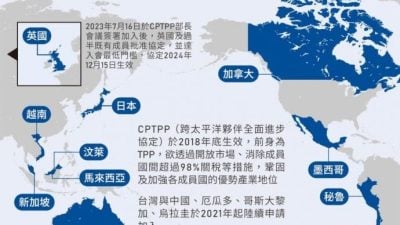
The Institute for Democracy and Economic Affairs (IDEAS) applauds the United Kingdom’s accession to the Comprehensive and Progressive Agreement for Trans-Pacific Partnership (CPTPP), recognizing it as a significant step towards strengthening trade ties.
IDEAS welcomes more trade partners to participate and embrace the CPTPP.
On top of that, IDEAS urges the Malaysian government to provide an action plan for the full implementation of this comprehensive trade agreement to realize its benefits in increasing economic activity in the country.
The CPTPP has been named a landmark trade agreement with significant implications for the Asia-Pacific region and beyond.
The CPTPP represents a mega free trade agreement with 11 signatories, all of which are Asia-Pacific countries that collectively account for 13 per cent of the global gross domestic product (GDP).
By lowering barriers to trade in goods and services among member countries, the CPTPP aims to create a more seamless and integrated trading environment in the region.
The CPTPP goes beyond just the removal of tariff barriers and import levies, with common obligations on a range of issues, including environmental policies, labor standards, digital economy, investment and food regulations, among others.
As a signatory to the CPTPP, Malaysia has already taken steps towards implementing the agreement and stands to benefit significantly from increased trade flows and investment.
As per the Cost-Benefit Analysis report produced in 2022, Malaysia’s ratification is projected to see GDP and investment increase by US$56.5 billion and US$112.3 billion respectively over the period of 2021 to 2030, whilst Malaysia would enjoy a continued trade surplus of US$53.5 billion in 2030.
Importantly, this translates into significant welfare gains for Malaysia, which is projected to increase by US$15.1 billion in 2030.
Additionally, three years after its departure from the European Union, the United Kingdom has successfully signed onto the CPTPP, and it is now part of a consortium with 11 other countries.
The recent addition of the United Kingdom as the latest signatory to the CPTPP is a clear indication of the growing importance of this trade pact on the global stage.
Dr. Juita Mohamad, Director of Research at IDEAS, pointed out that “with the UK’s accession to the CPTPP, member countries like Malaysia are able to expand their market beyond their borders.
“The CPTPP will provide our local businesses with opportunities. Furthermore, we consider it a significant achievement that Malaysia was able to effectively negotiate with the UK the removal of tariffs on Malaysian palm oil of 12 per cent in its first year of entry.”
Through free trade agreements, competition is enabled and this creates efficient producers, benefiting domestic consumers who can now access relatively cheap and superior quality goods and services.
Domestic producers will also be able to access larger foreign markets, improving their earning potential.
IDEAS conducted a study in 2020, assessing the economic effects on Malaysia if other potential partners like Taiwan were to join the CPTPP fleshing out the above-mentioned broad economic concepts.
The study found largely positive macroeconomic implications.
Malaysian GDP would increase by an additional 0.15 per cent or over US$500 million per year in the medium to long term.
Exports and imports are projected to increase further, with overall employment estimated to increase by a further 0.13 per cent, with nearly an additional 20,000 people in work.
IDEAS further elaborated that with the UK as a member of CPTPP, it is hoped that trade relations can be strengthened over time and best practices from the UK and other member countries can serve as a guide for Malaysia as it completes its implementation process and translates the agreement into clear laws and guidelines in the next few years to come.

ADVERTISEMENT
ADVERTISEMENT







































